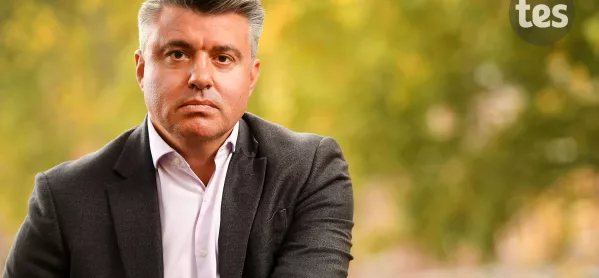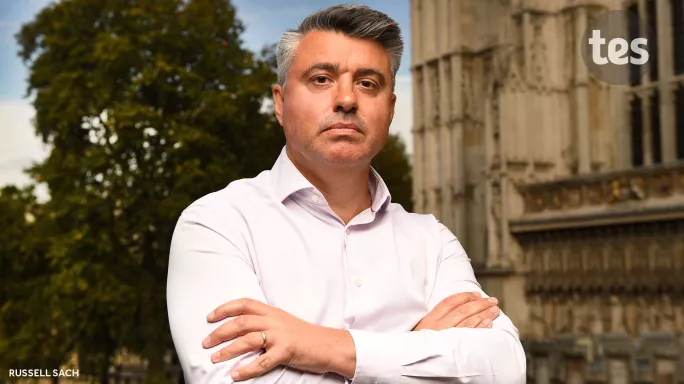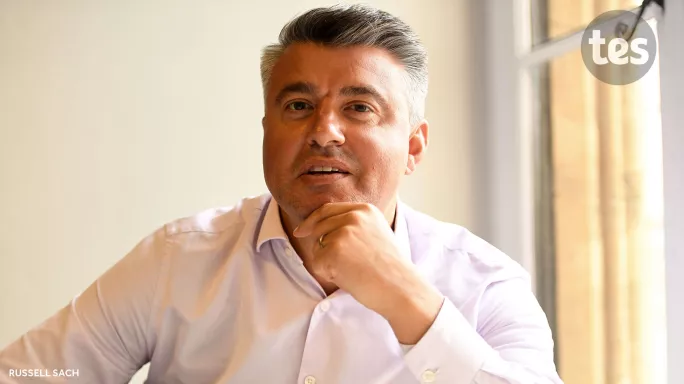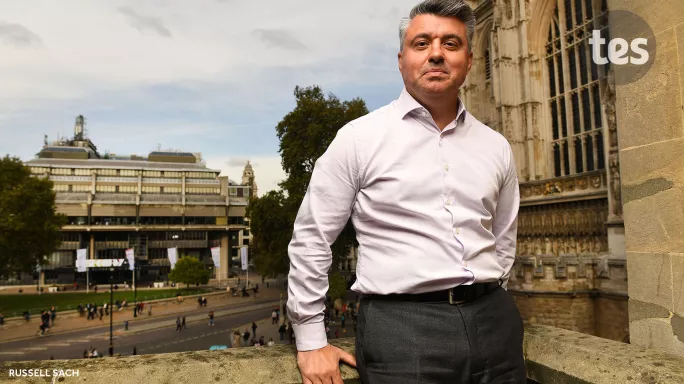- Home
- Meet the man on a mission to make a success of UTCs
Meet the man on a mission to make a success of UTCs

“It’s a little bit David against Goliath,” says Simon Connell, flashing a hint of a smile. He is reflecting on his role as chief executive of the Baker Dearing Educational Trust.
Connell took on the role at the helm at the organisation behind the university technical colleges (UTC) programme last summer. And he’s certainly not had a straightforward first few months in the job.
To be fair, the UTC movement, championed by Baker Dearing chair Lord Baker, has not had an easy time of it since its inception. Ten of the first 58 UTCs to open have already closed. And a highly critical report by the National Audit Office (NAO) published in October found that the 48 open at the start of this year were operating at 45 per cent capacity.
The NAO also highlighted concerns about both the standards and financial viability of UTCs which the Department for Education has spent £792 million on since the programme first launched.
Connell’s response was forthright. While acknowledging “poor leadership and governance” at some of the UTCs which closed down, he insisted that the NAO did not give a “fair assessment” of the programme, describing the report as painting a ”glass half empty” picture.
Full story: Half-full and underperforming - damning report on UTCs
Background: DfE to reduce pressure on technical schools over Progress 8
Exclusive: UTC to shut ahead of Ofsted report

Why the future is bright for UTCs
But, when asked what the 2020s will have in store for UTCs, Connell is unashamedly upbeat. “Employers are still keen as mustard to have more UTCs, because they are seeing the benefit,” he says. “And so there’s a lot of interest from employers to continue to grow the programme. What’s important to me is that if we can actually get the calibre of what we’ve got to a uniform level - if we can get every UTC on trajectory to be full, if we can get the quality of education to good [as] the new normal - if we can continue the destinations and get that uniform quality, I think then we can have a quantum leap to the next number of UTCs.”
Talking targets is a dangerous business when it comes to new types of education provider. Lord Baker - and, indeed, former prime minister David Cameron, a major supporter of the embryonic UTC programme - famously called for one of the institutions in every town.
Given that Connell’s approach is focused on improving the quality of UTCs before increasing the quantity of them, does he have a number in mind for how many colleges there should be in, say, five years’ time?
His answer is cautious: the total of 14,500 students currently attending UTCs amounts to half a per cent of the national total, he says. “It seems to me that if we were full we’d still only be 1 per cent of the secondary population.
“There’s a significant minority of people who would be interested in this sort of programme. The fact we won’t do key stage 3, probably double where we are would be an appropriate…” Connell doesn’t finish the sentence, falling just short of publicly committing to double the number of UTCs.
Building trust with parents
“Another way to think about it,” he suggests, “would be every MAT in the country having a UTC, those sort of things. Look, if it’s good and young people like it and they’re full, logically of course we’d want a lot more [UTCs], wouldn’t we? Because the market would be saying this is something we want. I’d like to think that, at the end of the day, the person who decides how many UTCs there will be is not me or Lord Baker or the secretary of state. It’s the representatives of the student body of one UTC saying, ‘My brother or sister can’t get into this UTC, we need more.’ It needs to be student led.”
Connell is keen to stress that the UTC movement is still in its infancy. “The average age of a UTC is just four years, so it’s still early days. If you get the right principal, the right chair of governors and the right governing body in place, things work very well. And when you don’t, they don’t. At the heart of the eight closures is just poor leadership and governance.”
And addressing problems early is a challenge, he concedes. “If you can turn it around, fine; if you can’t, it’s curtains. You have to build trust between parents and the educational establishment. Parents are risk averse, the default position is they don’t want to risk their child’s education, therefore you almost have to go that extra mile in order to win their trust. Clearly if the basic education, the fundamentals, are not quite right, it’s not going to work.”

One characteristic of UTCs which has made their integration into the education system more challenging is the starting age of 14 - three years after more students will have started their secondary education, and two years before they sit their GCSEs.
After previously opposing moves by UTCs to recruit at 11, Baker Dearing has more recently softened its stance.
Leigh UTC in Dartford, Kent, opened a five-form-entry key stage 3 feeder college, the Inspiration Academy, on the UTC site, in effect converting into an 11-18 school. More are expected to follow. So was the starting age of 14 a mistake?
No, Connell insists. “I think if you visit a UTC, you’ll see why starting at 14 makes a lot of sense. It’s a mature environment. A lot of 14-year-olds who come to UTCs are ready for that mature environment. It really catalyses their studies and they really thrive in that environment. From a theoretical point of view looking around the world, you can see completely why 14-18 makes a lot of sense.
“We are in a 11-18 system, a lot of young people probably don’t want to go to UTCs because they don’t want to leave their friends at 13 or don’t want to change schools. I get all that, I have huge sympathy with that. And so I think in many cases starting at 11 makes a lot of sense. I’m completely flexible.”
But where UTCs recruit at 11, the key stage 3 curriculum must remain broad if they are to address what Connell sees as one of the main problems in the system: the fact that girls are put off Stem by the time they reach the age of 14.
“One of the challenges the UTC programme has is that we can’t get a lot of girls at 14 because the system has turned them off Stem, it’s too late,” he says. “We are missing out on a decent chunk of the market because girls aren’t interested in Stem at that age, which is a tragedy. So for many reasons there is a pragmatism in changing the age range where appropriate.”
Another quirk of the prevailing 11-16 secondary structure is that UTCs recruiting at 14 have no say over the admissions code. If they are not full, they have to accept any applications they receive. As a result, many have found themselves accepting students not wanted by other local schools, Connell believes. “You can see how the system can be abused by local schools off-rolling. It’s been a problem in every UTC.”
Allowing teenagers to thrive
But the UTC environment can give disengaged students the opportunity to “thrive”. “We didn’t set the programme up for this, but one benefit of starting at 14 is it’s given a lot of young people a second chance. And, by God, what value do you put on that?”
Connell’s passion for education is clear. He attended a comprehensive in Steyning, West Sussex - and it was here that his life changed course. “I was really lucky there. I stumbled across a great maths teacher who taught me for seven years and gave me the confidence and the right tuition and got me into Cambridge. So I was a classic first generation going to university, social mobility story. As a consequence my life has been very different. I’ve always had a soft spot for education because it’s genuinely transformed my life.”
And so, after 15 years working in the City in the financial services industry, Connell set up school support services firm Educate. He has been development director of Baker Dearing since 2016, and last year was appointed the successor to CEO Charles Parker.
The UTC model is one which would have appealed to the young Connell. “I hated, French, English and the humanities,” he says, grinning. “I loved sport and I loved maths and science, but mainly maths. So I could see myself going to a UTC. A bit more practical, seeing how you translate theory to how this works in the working world. I was hooked with the whole programme.”
And Connell says that, despite the challenges of the job, he is still hooked. “This role appeals to me in lots of ways.” And one of Connell’s main sources of inspiration is his 85-year-old chair, Lord Baker. “This man is extraordinary,” he says, recounting an occasion where Baker, despite suffering from illness and a bad hip, still “nailed” a major speech in the House of Lords. “It’s just inspirational to be able to work for someone who is still at that age on his A-game. And I hope to do it for many more years.”

Keep reading for just £1 per month
You've reached your limit of free articles this month. Subscribe for £1 per month for three months and get:
- Unlimited access to all Tes magazine content
- Exclusive subscriber-only stories
- Award-winning email newsletters



